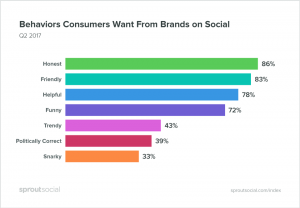8 Effortless Ways to Become More Authentic on Social Media
Authenticity is crucial for social media marketing. In fact, it is crucial for all marketing effort and as a brand. Anyone can build a social media presence, but the difficult part is to building a trustworthy, sending a brand message that is authentic, and that ultimately generates conversions.
Social media scandals and slip-ups are almost impossible to keep on your audience’s radar. As a result, brands have no other choice than to stay authentic and present yourself transparently and honestly on social media.
The challenge, however, is that marketing in itself isn’t authentic. Brands are aggressively downgrading their competitors while trying to present their brand and products in the most appealing way possible while trying to hide and scoop away any negativity that comes creeping up to the surface.
Brands that successfully makes authenticity an important part of their social media strategies, however, see great results and see that their customers are doing their marketing for them. Tweak your social media strategy towards the more authentic side of things and you will see it too!
In this article, we’re looking at 8 Effortless Ways to Become More Authentic on Social Media
1. Share authentic posts
Your social media posts are an important part of your social media presence, and it is also with the help of those that you will reach your audience. Therefore, you need to put great emphasis on incorporating authenticity in every single post you share.
Considering the fact that 91 percent of customers want brands they follow to be authentic in their social media posts, according to an infographic from the agency Bonfire Marketing, ignoring authenticity in your posts is something you can’t afford.
They also want you to be everything that is related to authenticity.

Everyone knows that no one is perfect, and especially not brands. So don’t pretend like you are! Of course, you want to present your products in the best light possible, but showing them in a less positive light, or more correctly more realistic light, will actually have a positive effect on your brand – even though it seems unlikely at first thought.
When you share photos that aren’t photoshopped to perfection and where everything looks like it was taken out of a paradise postcard, your authenticity will fly through the roof, and people will trust you more. When they know that you also share things that aren’t completely perfect all the time,
It’s just like if you ask someone how they are and they always say “perfect”, and tell you how amazing their life is. Yeah, right, you think to yourself, and start taking their words with a pinch of salt. If you are always presenting a spot-on perfect image of your brand in every single social media post of yours, people will start trusting you less, and they will wonder what the real truth is like.
You should of course not just present the negative image because after all, you’re a brand that wants to sell, but try to find a realistic balance. If your product is known to break on a particular spot, admit it, and show your audience how you have worked to solve it. Because that’s what people really want to see!
2. Be humble
Being humble goes for all aspects of social media. In this exact point, I’m especially putting pressure on being glad for someone else’s success.
A great thing you can do if you want to come off as more authentic is that you show your audience that you feel joy when someone else is feeling well, or having success in any way.
If you are engaging with your audience (which you should), and see with envy that one of your customers are enjoying a relaxed vacation, learn to be happy for them, and engage with them in a way that shows you are glad to see that they are doing well.
Cultivating an attitude of genuine pleasure in other people’s pleasure is something that instantly boosts your own authenticity, and it’s also a really interesting topic. As opposed to what some people think, being glad for someone else is actually beneficial for you as well, because it sheds a good light on your brand’s personality as well, and you come off as more authentic.
This also goes for your competitors. In fact, it is especially relevant when talking about your competitors. Brands have a culture of spreading negativity around their competitors and telling them how bad they are, but if you are someone who is doing this, it’s only going to hurt you. When you are going around and talking crap about your competitors, it says something about your own brand. What are you hiding? What are you trying to compensate for?

By instead being happy for your competitors’ success, and admitting that they are also doing things well, you will come off as a more authentic person, and an honest and transparent brand that has nothing to hide or compensate for.
Very few brands dare to talk good about their competitors in fear of their customers choosing them, but the truth is that if you do, you’ll benefit from it in the long-term.
Keep a balance between personal sharing and sharing things that are interesting, useful, or humorous.
Nobody wants to have your ads shoved down their throats over and over again. The key to sharing authentic content is to provide value with the content you share.
3. Listen and Respond
There’s not much that harms your authenticity and turns off your audience as much as you have a one-way conversation. Social media is called social for a reason – you’re supposed to engage and interact!
Therefore, you need to put great focus in listening to your audience, acknowledging them, and then interacting with them.
Listen to what your audience has to say and respond to them in a timely, and genuine matter. When doing so, it is extremely valuable to have developed a brand voice that you use. All audiences have different personalities and speak a different language, and by being aware of that, and using a similar language, you’ll be able to resonate better with them and come off as an authentic brand in your industry.
Take a look at this awesome post by cool mom picks that gets their audience engaged:

Don’t just respond to comments and messages with generic phrases that seem like they’ve been pre-written and stored in your warehouse for you to bring out every time you receive a similar message. Take your time to read, understand, and respond using a genuine and personal touch. Incorporating a bit of personality in your answers will also help you be more approachable and someone that your customers actually enjoy talking to.
4. Know what you are using social media for
Being successful on social media is finding a balance between authenticity and marketing, and there’s no denying that it’s a difficult task as a brand.
Think about how you can make a strong impact on your audience while at the same time staying authentic. When you’ve got a hang of it, you will be able to share posts that do both, and that’s when you know you’re onto something.
Just like Skittles:

Here, an important part is providing your audience value with the content you share. The general rule for brands on social media is the 80/20 rule. This means that you should share 20% marketing posts and 80% of content that provides your audience with value. It can be anything from knowledge to information, to just a good laugh.
If you are sharing marketing post after marketing post, eventually people will get tired, and it will harm your authenticity.
Try to incorporate content that is relevant to your niche and brand and that your audience will enjoy. This way, you’ll stay true to your niche, and remain authentic, while also making your audience happy and more engaged.
5. Be Consistent
When you are going to be authentic, it is extremely important to stay true to your brand’s values and to have a consistent personality.
If someone suddenly changes personality, their authenticity will instantly disappear, and so will their trust. People will start wondering “who are they, really?” and “If the personality I just got to know was false, have they been lying to me all the time?”.
Your brand’s voice and your brand’s personality should remain the same no matter what. Across social media platforms, in the digital world, as well as in real life.
To be able to be consistent, having a social media strategy is extremely helpful. What’s more, having a well-developed social media style and brand message strategy will help you stay true to your personality no matter what happens and how much time passes.
Look at Montieres consistent and similar-styled visuals on Instagram:

If you present different personalities across your different social platforms, it will have a negative effect on your authenticity, and people will have a harder time building a relationship with you. If you, however, do the opposite, the results will be opposite as well.
Creating a personality doesn’t have to be difficult. It can be as simple as having a logo that is the same across your platforms, sharing similar-styled content, and deciding on the main personality you want to have (for example funny, controversial, conservative etc) and then sticking to it.
6. Put the focus on your audience
If you don’t know your target audience, building trust will be extremely difficult, if not impossible. Having a social media strategy isn’t enough. You also need to create buyer personas that clearly define who your customers are. This will allow you to make decisions that will resonate with them, and optimize your social ads so that they are relevant to the people you are targeting.
If you are a brand selling dog equipment, chances are, your target audience is people who have a dog. If you start sharing cat-related content and acknowledging cat-related events and holidays, it will show that you don’t have a clue to who your customers are, and this will create a distance between you and your audience, keeping you from building an authentic image.
Look at your customer persona, or create one if you haven’t already, and then tweak your social media strategy and efforts to perfectly fit that group’s needs and interests.
If you create the feeling that you know your audience very well, they will be more interested in learning who you are. This is relevant for all parts of social media.
7. Stay true to your brand’s values
With every new marketing effort, you plan to do on social media, you should ask yourself “What is my business about?” and “Does this reflect the personality my business has?”. Here, your social media style and brand message that we discussed above, is super helpful, because it means you’ve already put some great thought into it when you already have a clearly defined strategy that touches upon these things, in place. In order to build authenticity, it starts with the
In order to build authenticity, it starts with the inside and making sure your employees, as well as yourself and team, knows your company and the personality that should be followed down to its core. If not even you or your team knows your brand’s values, how could your customers do?
Before you start engaging and building your social media presence, make sure you are 100% certain everyone knows the brand so they can mediate that personality to your customers. When you do, your brand will come off as more authentic and more trustworthy.
8. Be personal
When thinking about building relationships with your audience, and as a result increasing your authenticity, being personal is an important part of it. If you are talking to someone and they’re only talking objective, without ever including their opinions or thoughts, it will be impossible to get to know that person and to understand their personality and who they are. The same principle goes for brands.
Some people avoid being personal as a brand because of fear that they’ll come off as unserious or unprofessional, but that couldn’t be further from the truth. Large corporates are especially struggling with the personal touch, and to some extent, it’s understandable, because it’s very difficult to run a large organization. But the problem is that by not being personal on social media, or any part of the sales funnel for that matter, you make it more difficult for your audience to get to know you, and build a deep relationship with them, that will lead to them becoming loyal supporters of your brand.
A great way is to get your employees and team members to become brand advocates and talk about their experience and knowledge, themselves. This will let people understand who is working within the company, what they do, and who they are talking to you when they are interacting with your brand on social media.
Nobody likes interacting with a faceless brand, and if you just present the faces that are behind, it, you will find it much easier to build authenticity on social media


